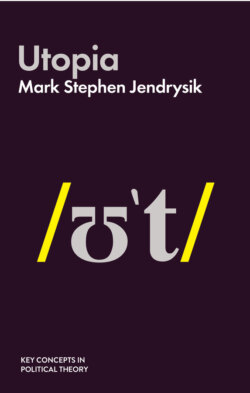Utopia

Реклама. ООО «ЛитРес», ИНН: 7719571260.
Оглавление
Mark Stephen Jendrysik. Utopia
Contents
Guide
Pages
Series title. Key Concepts in Political Theory
Utopia
Copyright page
Acknowledgments
Introduction
1 What is Utopia? What is Utopian Political Thought?
Homo utopicus: The Mindset of the Utopian Animal
Defining Utopia/Utopianism
Types of Utopia
Defining Utopian Political Thought
Utopia and Politics
Are Utopia and Utopian Political Thought Western Manifestations?
2 Utopianism Before Utopia
Sparta as Utopian Myth/Model
Plato’s Republic: The Great Thought Experiment
The Problem of Total Commitment
The Bible as Utopian and Dystopian Inspiration
3 Inventing Utopia
Utopia as Critique
The Just Society
Religion and Politics in Utopia
More’s Utopia as Political Thought
4 Utopia and the Age of Revolution
Utopian Dreaming in the English Revolution
Gerrard Winstanley and the Diggers
James Harrington’s Immortal Commonwealth
The American Revolution and Thomas Paine
Jean-Jacques Rousseau and the French Revolution
The Problem of Utopia and Revolution
5 Utopia and Modernity
Varieties of Nineteenth- and Early Twentieth-Century Utopian Thought
Bellamy’s Disciplined Utopia
Morris’s Pastoral Utopia
Wells’s Platonic Utopia
Gilman’s Feminist Utopia
Twentieth-Century Variants on the Theme
Utopia as a Process
Toward Dystopia
6 Utopia and/as Ideology
Marx/Marxism as Utopian
Ernst Bloch: Hope and Dreams
Libertarianism as Utopian Ideology
Designing Libertarian Utopia
Utopia as Liberation
Whither Utopian Thought?
7 From Utopia to Dystopia
Dystopian Themes: Freedom/Isolation/Hidden Evil
Zamyatin’s Machine State
Huxley and Inhuman Stability
Orwell and the Nihilism of Power
Atwood and Dystopian Isolation
The Dystopian Post-human
The Anthropocene as Dystopia
The Necessity of Dystopian Political Thought
8 Does Utopia Have a Future?
The Status of Utopia
The Future of Utopian Theory
What is to be done?
References
Index
POLITY END USER LICENSE AGREEMENT
Отрывок из книги
Mark Stephen Jendrysik
Any student who begins to study utopian political thought faces a daunting yet exciting task. Daunting because of the vast scope of the subject and its enormous and growing historical and philosophical range. Exciting because utopian thought calls forth a desire for a better world and presents the student with a massive menu of choices in terms of what and whom to study and where to place her energies.
.....
Utopian thought looks toward a social, political and economic organization for humanity that is self-evidently right to the people who live under it. Utopia is aspiration, planning and action directed toward attaining a more just society. But an honest contemporary utopian will recognize the impossibility of a final answer. To avoid the clear dangers of utopian ideals enabling oppressive regimes, she will aim for utopias that recognize human autonomy and liberty and the dynamic nature of human society. Sargent sums up this approach: “most utopias aim to improve the human lot not by repression but by enhancement, and as long as we do not aim for perfection or eliminate the possibility of change, such utopias can stand up to the all-too-prevalent dystopias of the present” (2006: 15).
Sargent says, “dissatisfaction is the beginning of utopianism” (2010: 48). But utopian thought must do more than just point out problems. Political thought that merely critiques existing injustices provides no way forward. Utopian thinkers must provide a meaningful set of ideas that might be applied to contemporary society. We should always keep in mind that many things that once seemed impossible are now commonplace. Utopia does not arise naturally. Its creation represents an act of human will that creates a break in history. Consider More’s island of Utopia. The island was once a part of the mainland. It was severed from that connection by the order of King Utopus. What does this mean? Utopian thought and action require a separation from the mundane, from the existing world and its ways of life. Utopian thought seeks to open mental space for new and different understandings of how to organize our lives. In doing so it tries to expand the limits of what is possible and desirable by challenging political, social and economic structures that appear “natural.” So, in Agrarian Justice (1797), Thomas Paine tries to change the minds of his contemporaries about the meanings of property, merit and desert. Karl Marx makes a similar effort, working to fundamentally shift understandings about the relations of labor and capital.
.....